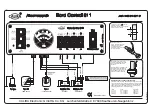
Page
112
Bench testing
Remove the commutator end cover from the motor and check the
brushes for wear and replace if necessary.
Measuring light running current
Clamp the motor in a vice and, using a 12 volt battery. with a moving
coil ammeter of suitable range, check the light running current and
the armature speed. Always use heavy gauge cabling for this test.
Under light load the motor should run freely with a current of 65
amps at 8000-10,0000 rpm. The test only proves that the motor
functions correctly when not at its normal operating load. If, on
refitting the motor, it again fails to crank the engine an internal
fault is indicated and a replacement motor will need to be fitted.
Starter motor specification
Lock torque
0.97kg/m (7.0 lb/ft) @ 350 amps
Running torque
0.61 kg/m (4.4 lb/ft) @ 260 amps
Light running current
65 amps @ 8-10,000 rpm
Brush spring pressure
800gf (28 ozf)
Charging system
The charging system comprises a battery, alternator and ignition
warning light as shown in Figure 8.
Summary of Contents for Kitten Estate
Page 15: ...Page 15...
Page 17: ...Page 17...
Page 22: ...Page 22...
Page 26: ...Page 26...
Page 38: ...Page 38 Figure 4 Engine cylinder block exploded...
Page 54: ...Page 54...
Page 55: ...Page 55...
Page 65: ...Page 65...
Page 66: ...Page 66...
Page 75: ...Page 75...
Page 77: ...Page 77...
Page 90: ...Page 90...
Page 92: ...Page 92...
Page 97: ...Page 97...
Page 100: ...Page 100...
Page 101: ...Page 101...
Page 103: ...Page 103...
Page 108: ...Page 108...
Page 114: ...Page 114...
Page 116: ...Page 116...
Page 117: ...Page 117...
Page 118: ...Page 118...
Page 119: ...Page 119...
Page 120: ...Page 120...
Page 123: ...Page 123...
Page 124: ...Page 124...
Page 126: ...Page 126...
Page 130: ...Page 130...
Page 131: ...Page 131...
Page 133: ...Page 133...
















































